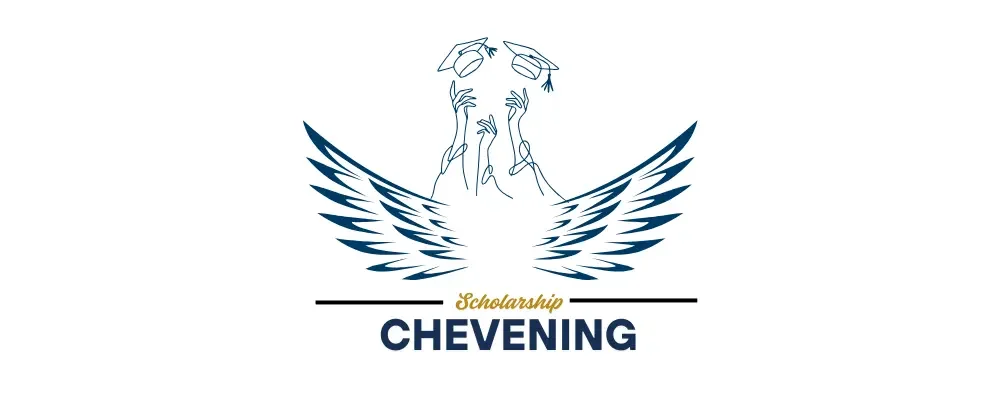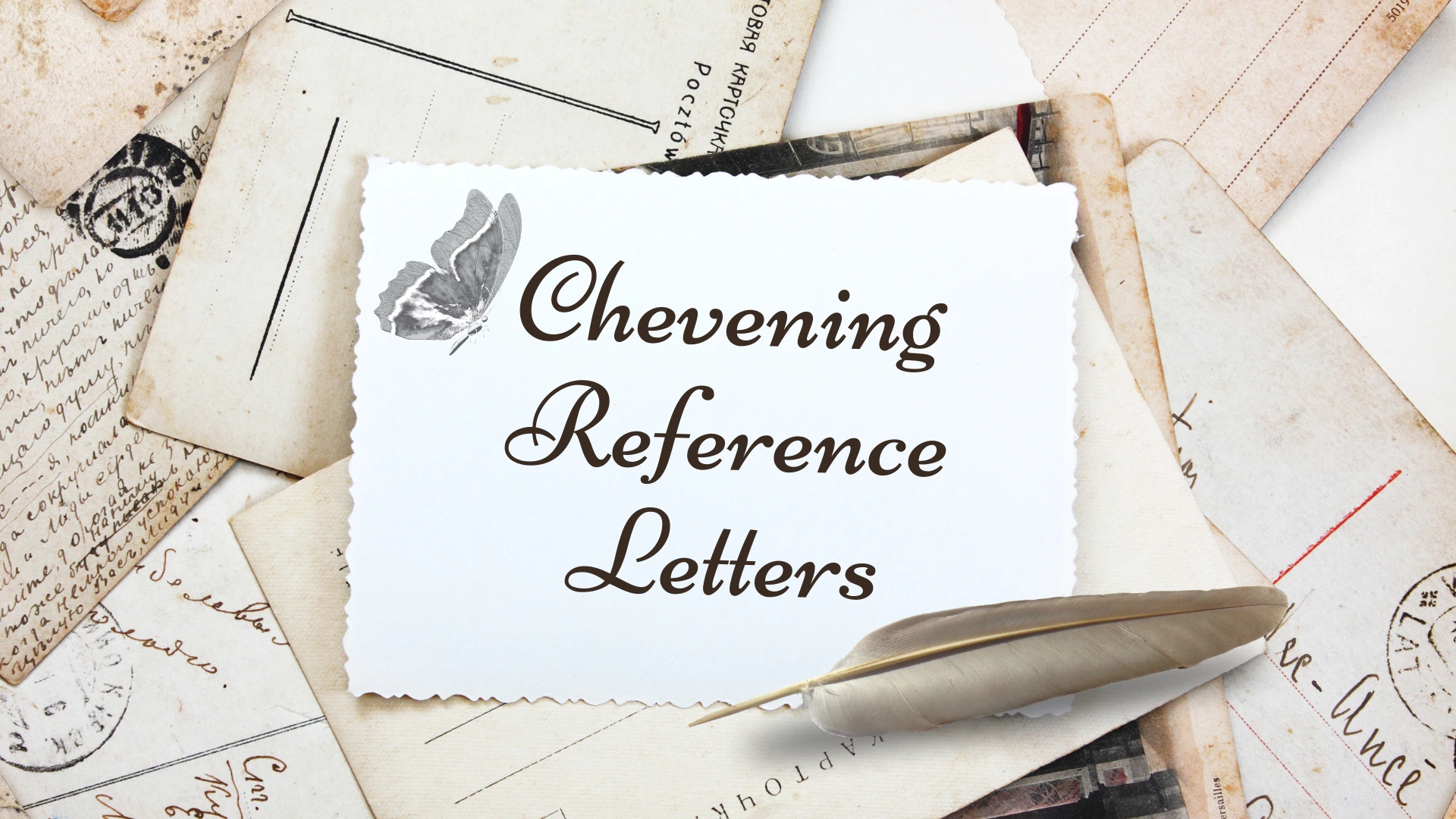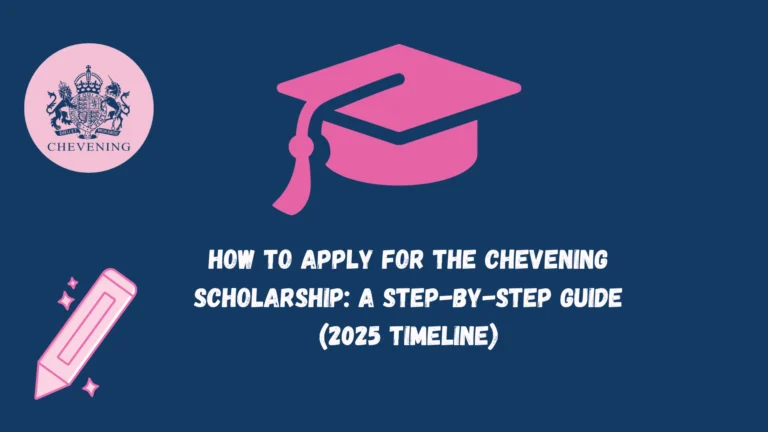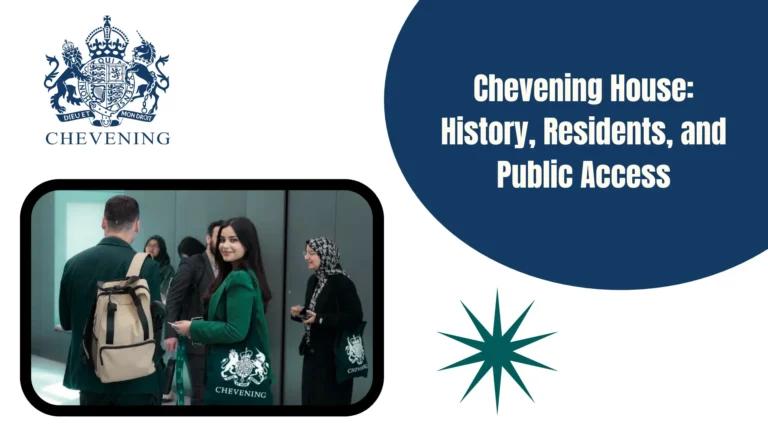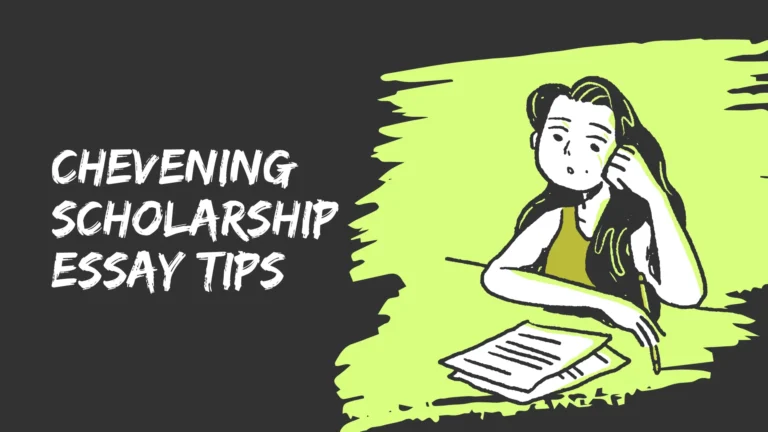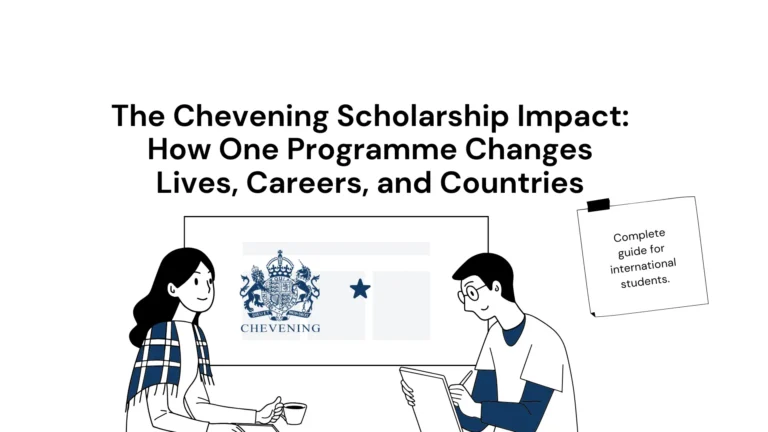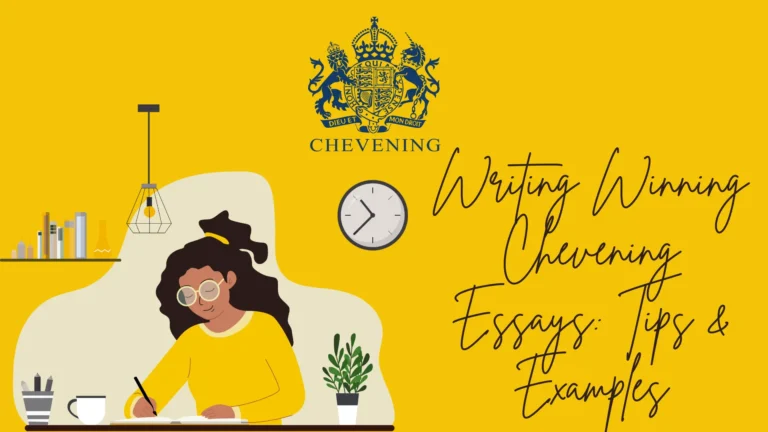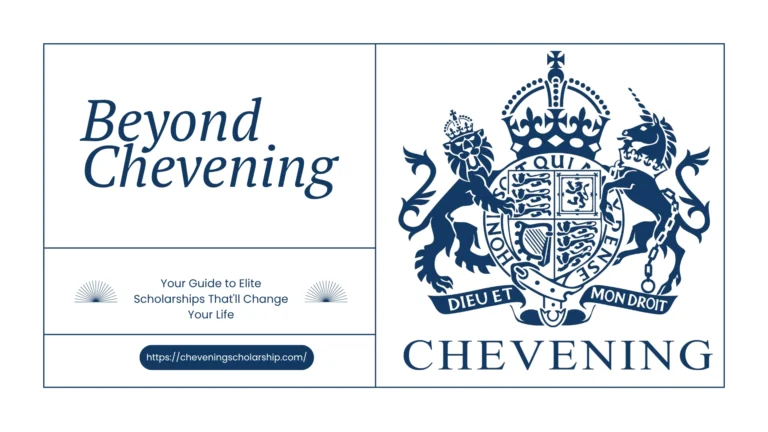Chevening Reference Letters: The Complete Guide to Getting Stellar Recommendations
Here’s a truth bomb for you: your Chevening reference letters might be the most underestimated part of your entire application. While you’re obsessing over your essays, perfecting every word and comma, those two reference letters are quietly working behind the scenes—and they could be the deciding factor between acceptance and rejection.
I’ve seen brilliant candidates with perfect GPAs and impressive CVs get rejected because their reference letters were… well, forgettable. And I’ve watched dark horse candidates with decent (not exceptional) credentials sail through because their referees absolutely nailed those letters. So yeah, this matters. A lot.
Let me walk you through everything you need to know about Chevening reference letters—from choosing the right people to making sure they submit on time without you having a nervous breakdown.
How to Write a Winning Chevening Personal Statement: Your Complete Guide to Standing Out
What Are Chevening Reference Letters, Really?
Before we dive into the nitty-gritty, let’s get clear on what we’re dealing with. Chevening requires two reference letters as part of your application. These aren’t just character witnesses saying “Yeah, they’re nice.” They’re professional assessments of your potential as a future leader.
Think of your reference letters as third-party validation of everything you’ve claimed in your essays. You can write all day about being a natural leader with excellent networking skills and a passion for public service, but when someone else confirms it? That’s when the selection panel starts believing you.
The Chevening reference letters are submitted directly by your referees through an online portal—you won’t see them unless your referee chooses to share a draft with you. This confidentiality thing can be nerve-wracking, I know. But it’s designed to ensure honesty and authenticity.
Why These Letters Can Make or Break Your Application
Let’s be real. The selection panel reads hundreds, sometimes thousands of applications. After a while, all those essays start sounding the same. “I’m passionate about development…” “I want to make a difference…” “I’m a dedicated professional…”
But reference letters? Those provide an outside perspective. They show how others perceive you, how you perform under pressure, what you’re like to work with. They add dimension to your application, turning you from words on a page into a real person with verified qualities.
Plus, they answer the question every selection committee is secretly asking: “Is this person actually as good as they say they are, or are they just good at writing applications?”
The Two-Letter Rule: Quality Over Quantity
Chevening asks for exactly two reference letters. Not one. Not three. Two.
This means you need to be strategic about who you ask. You can’t hedge your bets by getting five letters and hoping two are good. You need both letters to be excellent.
Here’s what I’ve learned about choosing referees:
Letter One should typically come from someone who can speak to your professional capabilities—your current or former supervisor, a manager, or someone who’s worked closely with you in a professional setting. They should be able to discuss your work ethic, leadership skills, and professional achievements.
Letter Two should ideally offer a different perspective—perhaps an academic referee if you’re a recent graduate, or someone who’s seen you in a different capacity (maybe through volunteer work, a professional organization, or a significant project). The key is complementarity, not redundancy.
Who Makes the Perfect Chevening Referee?
Choosing your referees is like casting actors for a movie about your life. You need people who know the story well enough to tell it convincingly, but different chapters of it.
Strong referee choices include:
- Your direct supervisor or line manager
- A senior colleague who’s mentored you
- A university professor who taught you and can speak to your academic abilities
- A director or CEO you’ve worked closely with on projects
- A leader from an organization where you’ve volunteered significantly
- A client or partner who’s seen your work impact firsthand
Weak referee choices include:
- Family members (obviously)
- Friends, regardless of their impressive titles
- Someone who barely knows you but has a fancy designation
- A referee who supervised you five years ago and hasn’t stayed in touch
- Someone who’s writing letters for ten other Chevening applicants
The golden rule? Choose someone who knows you well over someone who’s famous. A thoughtful, detailed letter from your direct supervisor will always beat a generic letter from a minister who met you once at a conference.
The Chevening Selection Process: Your Complete Roadmap from Application to Acceptance
What Should a Chevening Reference Letter Include?
Right, so what actually goes into these letters? Let me break down the anatomy of a strong Chevening reference letter:
Opening Context (1 paragraph): Your referee should establish their credentials and explain their relationship with you. How long have they known you? In what capacity? Why are they qualified to assess your potential?
Professional/Academic Competence (2-3 paragraphs): This is where they discuss your skills, achievements, and capabilities. Specific examples are gold here. Instead of “she’s a great leader,” they should write something like “When she led the regional health initiative, she coordinated a team of 12 professionals across three districts, resulting in a 40% increase in vaccination rates.”
Leadership and Networking Abilities (1-2 paragraphs): Since Chevening focuses heavily on leadership potential and networking, referees should address these specifically. Have you taken initiative? Built coalitions? Influenced others?
Commitment to Home Country (1 paragraph): This is unique to Chevening. Your referee should confirm your commitment to returning home and making an impact. This isn’t about nationalism—it’s about demonstrating genuine ties and plans.
UK Study Justification (1 paragraph): Why does studying in the UK make sense for your career trajectory? Your referee might mention how specific UK expertise aligns with your goals or your country’s needs.
Closing Endorsement (1 paragraph): A strong, clear recommendation. None of this wishy-washy “I suppose they’d be okay” business. Chevening wants to see “I recommend this candidate without reservation.”
The Format That Actually Works
Let’s talk structure because format matters more than you think. A well-formatted reference letter looks professional, is easy to read, and conveys seriousness.
Standard Chevening reference letter format:
[Referee's Letterhead or Professional Address]
[Date]
To the Chevening Scholarship Selection Committee,
Opening: Relationship and context
Body: 4-6 paragraphs covering competence, leadership, networking,
country commitment, and UK study rationale
Closing: Strong endorsement
Conclusion: Contact information and availability
Sincerely,
[Signature]
[Typed Name]
[Title]
[Contact Information]
The letter should typically be 400-600 words—long enough to be substantive, short enough to respect the reader’s time. It should be on professional letterhead if possible (university or company), printed, signed, and converted to PDF for submission.
Some referees ask if they can handwrite letters. While there’s a romantic charm to handwritten letters, honestly? Go digital. It’s easier to read, more professional, and significantly simpler to submit through the online portal.
How to Ask Someone to Be Your Referee (Without Being Awkward)
Okay, this is where it gets uncomfortable for many people. Asking for reference letters feels weird, especially if you’re from a culture where self-promotion is discouraged. But here’s the thing—if you don’t ask, you definitely won’t get.
Step 1: Choose the Right Moment
Don’t ambush someone in the corridor or at the end of a long meeting. Schedule a specific time to talk, either in person or via video call. This shows respect for their time and signals that you’re taking this seriously.
Step 2: Make Your Request Clear and Complete
When you ask, provide context. Explain what Chevening is (many people haven’t heard of it), why you’re applying, and specifically why you’re asking them. Be honest: “I’m asking you because you supervised my work on the health policy project, and I think you can speak to my leadership and analytical skills better than anyone.”
Step 3: Make It Easy for Them
Provide everything they might need:
- A brief about the Chevening Scholarship and what it values
- Your CV or resume
- Your Chevening essays (so they can complement, not repeat)
- A list of projects/achievements they might mention
- Specific qualities or experiences you hope they’ll highlight
- Clear deadline information
- The submission portal details
Step 4: Give Them an Out
Always say something like: “I understand if this doesn’t fit your schedule. I’d rather you recommend someone else who has more time than feel pressured to write something rushed.” This does two things: it shows maturity, and it ensures that if they agree, they’re genuinely committed.
Step 5: Follow Up Respectfully
Send a gentle reminder about two weeks before the deadline, then again a few days before. Use a polite, grateful tone: “Just wanted to check if you need anything else from me for the reference letter. The deadline is approaching on [date].”
The Email Template That Gets Results
Since we’re being practical here, let me give you a template that actually works:
Subject: Request for Chevening Scholarship Reference Letter
Dear [Name],
I hope this email finds you well. I’m reaching out to ask if you would be willing to write a reference letter for my application to the Chevening Scholarship, a prestigious UK government program that funds postgraduate studies for future leaders.
I’m applying to study [Your Course] at [Your University], and I believe this program will significantly enhance my ability to [Your Goal related to home country]. Given your supervision of my work on [Specific Project/Role], I think you’re uniquely positioned to speak to my [relevant qualities—e.g., analytical skills, leadership potential, commitment to public service].
The reference letter would need to be submitted by [Date] through an online portal that I’ll share with you once you confirm. I’ve attached my CV and a brief document outlining the scholarship and key themes that might be helpful.
I completely understand if this doesn’t fit your schedule. Either way, I appreciate your consideration.
Thank you for your time and guidance over the years.
Best regards,
[Your Name]
See? Professional, clear, not too long, and gives them everything they need to make a decision.
Common Mistakes That Sabotage Reference Letters
Let me save you from some painful lessons I’ve seen others learn the hard way:
Mistake #1: Choosing Impressive Titles Over Genuine Relationships
That government minister might have a fantastic title, but if they met you once for fifteen minutes, their letter will be generic and forgettable. The selection committee can spot these from a mile away.
Mistake #2: Leaving It Too Late
Giving your referee one week before the deadline is setting everyone up for failure. Quality reference letters take time. Aim to ask at least 4-6 weeks in advance.
Mistake #3: Not Providing Enough Information
Your referee is busy. They might have known you well two years ago, but they’ve supervised dozens of people since then. Give them specific examples, projects, and achievements to jog their memory and strengthen their letter.
Mistake #4: Asking for Both Letters from the Same Context
Two letters from professors? Or two from work colleagues? You’re wasting an opportunity to show different dimensions of your abilities. Diversify your referees.
Mistake #5: Not Following Up
I get it—you don’t want to be annoying. But here’s what’s more annoying: having your application disqualified because a reference letter didn’t arrive. Follow up. It’s your future on the line.
Mistake #6: Submitting Letters That Contradict Your Essays
If your essay talks about your leadership of a major project, but your reference letter doesn’t mention it at all, that’s a red flag. Make sure your referees know the narrative you’re building.
Academic vs. Professional Reference Letters: Which One?
This is one of the most common questions I get, and honestly, there’s no one-size-fits-all answer. It depends on your situation.
If you’re a fresh graduate or within 1-2 years of graduation:
Go for one academic reference (from a professor who supervised your thesis or taught you in multiple courses) and one professional reference (from an internship, part-time job, or volunteer position).
If you’ve been working for 3+ years:
Two professional references usually make more sense. However, if you’ve maintained a strong relationship with an academic mentor who’s seen your professional growth, that can still work.
If you’re currently pursuing postgraduate studies:
Consider one academic reference from your current program and one professional reference from your work experience before or during your studies.
The key question to ask yourself: Which combination best demonstrates my leadership potential, professional competence, and readiness for advanced study?
What Happens After They Submit?
Once your referees submit through the Chevening portal, you’ll receive a notification. You can track the status of your references in your application dashboard.
Here’s the timeline that typically unfolds:
6-8 weeks before deadline: You should have asked your referees and received confirmation.
4-6 weeks before deadline: Follow up to ensure they have everything they need.
2 weeks before deadline: Gentle reminder if you haven’t seen submission confirmation.
1 week before deadline: More urgent (but still polite) reminder.
Deadline day: If a reference hasn’t been submitted, contact both your referee and the Chevening team to explain the situation.
After submission: Send a thank-you note to your referees, regardless of the outcome. These relationships matter beyond this application.
The Reference Letter Deadline Panic: What to Do
Okay, so it’s five days before the deadline and one of your referees still hasn’t submitted. Don’t panic. Well, panic a little, but then do this:
- Call them directly (not email—this is urgent). Politely explain the situation and ask if there’s anything preventing submission.
- Offer to help with technical issues. Sometimes people struggle with the portal, and they’re too embarrassed to ask for help.
- Have a backup plan. If your referee genuinely can’t submit, you might need to quickly approach someone else. This is why having a third potential referee in mind isn’t a bad idea.
- Contact Chevening. Explain the situation professionally. Sometimes they can offer extensions for references if your main application is already submitted.
The Importance of Reference Letters in Chevening Scoring
Let’s talk numbers for a second. While Chevening doesn’t publish their exact scoring rubric, reference letters are believed to carry significant weight in the overall assessment.
Here’s what we know they’re looking for in references:
| Criteria | What Strong Letters Demonstrate | What Weak Letters Show |
|---|---|---|
| Leadership | Specific examples of leading teams, projects, or initiatives | Vague claims without evidence |
| Networking | Building meaningful professional relationships | Generic “gets along with people” |
| Academic/Professional Excellence | Quantifiable achievements and impact | Participation without distinction |
| Communication Skills | Articulate, persuasive, effective in diverse settings | Basic competence |
| Commitment to Home Country | Clear ties, specific plans for return | Ambiguous or absent |
| Potential for Impact | Track record of creating change | Good intentions without results |
Strong reference letters don’t just tick these boxes—they bring them to life with stories, examples, and genuine enthusiasm.
Authenticity: The Non-Negotiable Element
Let me address the elephant in the room: should you write your own reference letter and have your referee sign it?
Short answer: No. Please don’t.
I know this practice is common in some places, and I know some referees even request it because they’re busy. But it’s a terrible idea for several reasons:
First, the Chevening selection panel can tell. They read thousands of these letters. They know what a self-written letter looks like—it reads exactly like your essays, uses the same vocabulary, emphasizes the same points.
Second, it’s dishonest. Part of what makes reference letters valuable is their independence. If you write it yourself, you’re essentially creating a loophole in the evaluation process.
Third, it’s risky. If discovered (and it can be—through language analysis, inconsistencies, or interviews), it could disqualify your entire application.
Instead, if your referee is short on time, offer to create a bullet-point summary of key achievements they might mention. They can then use this as a reference to write their own authentic letter in their own voice.
Chevening Benefits and Coverage: Everything You’re Actually Getting (It’s More Than You Think)
Tips for Referees: If You’re Writing One
If you’re a referee who stumbled onto this article, welcome! Here are some quick tips for writing a reference letter that actually helps your candidate:
Be specific. “She’s an excellent leader” means nothing. “She coordinated a team of fifteen volunteers to organize a conference attended by 500 professionals, managing a budget of $20,000 and securing sponsorships from five major organizations” means everything.
Use concrete examples. Tell stories. Describe situations where you saw this person’s qualities in action.
Be honest. Don’t oversell. The selection committee values authentic assessment over hyperbole. It’s fine to mention areas for growth if you frame them as potential for development.
Address the Chevening criteria. Leadership, networking, academic/professional excellence, and commitment to home country should all feature.
Keep it professional but warm. Show that you genuinely believe in this person’s potential.
Proofread. A reference letter with typos undermines your credibility and, by extension, your candidate’s.
The Follow-Up: Don’t Forget This Part
After your reference letters are submitted and your application is complete, don’t disappear. Send a proper thank-you note to each referee. Not a quick text—a thoughtful email or, even better, a handwritten card.
Mention specific aspects of your relationship with them, acknowledge the time they invested, and keep them updated on your application progress. These are people who believed in you enough to vouch for you. That deserves recognition.
And here’s the thing: whether or not you get the scholarship, maintaining these relationships is valuable. These are mentors, advocates, and professional connections who can support your career in countless ways beyond this one application.
What If Your Application Doesn’t Succeed?
Let’s address this because it’s important. Chevening is incredibly competitive. Even with perfect reference letters, excellent essays, and a stellar CV, you might not get selected. The numbers are just tough.
If that happens, your reference letters can still be valuable. With your referees’ permission, you might be able to adapt them for other scholarship applications (Rhodes, Marshall, Fulbright, etc.). The relationships you’ve built with these referees can support future applications and career moves.
And if you apply to Chevening again next year, you can potentially use the same referees—though you should check with them and update them on your growth and new achievements since the last application.
The Bottom Line: Your References Are Your Reputation
Here’s what I want you to remember: your Chevening reference letters aren’t just bureaucratic requirements. They’re testimonials to your impact, your potential, and your character. They’re how other people see you when you’re not in the room selling yourself.
Choose your referees thoughtfully. Give them everything they need to write compelling letters. Follow up without being pushy. Show gratitude for their time and support.
And most importantly, live your professional life in a way that makes people excited to recommend you. Because the best reference letters come from referees who genuinely believe you’re going to change the world—or at least your corner of it.
The reference letters you’re requesting today are reflections of the relationships you’ve built over years. If you’re struggling to find two people who can enthusiastically vouch for you, that might be a sign to invest more time in meaningful professional relationships before applying.
But if you have those relationships—if there are people in your life who’ve seen your work, believe in your potential, and are willing to advocate for you—then go ask them. Make it easy for them. Give them time. And trust that their authentic assessment of you is exactly what the Chevening selection committee wants to read.
Now, stop overthinking it and start reaching out to your potential referees. Your future self will thank you.
